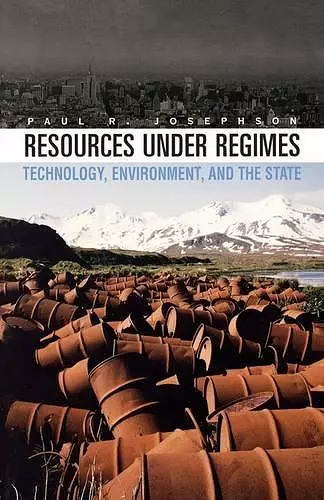Resources under Regimes
Technology, Environment, and the State
Format:Paperback
Publisher:Harvard University Press
Published:1st Oct '06
Currently unavailable, and unfortunately no date known when it will be back

Democratic or authoritarian, every society needs clean air and water; every state must manage its wildlife and natural resources. In this provocative, comparative study, Paul R. Josephson asks to what extent the form of a government and its economy--centrally planned or market, colonial or post-colonial--determines how politicians, bureaucrats, scientists, engineers, and industrialists address environmental and social problems presented by the transformation of nature into a humanized landscape.
Looking at the experiences of the industrialized and industrializing world, Resources under Regimes explores the relationship between science, technology, and the environment. Josephson considers global responses to deforestation, water pollution, and global warming, showing how different societies bring different values and assumptions to bear on the same problem, and arrive at different conclusions about the ideal outcome and the best way of achieving it. He reveals the important ways in which modern governments facilitate power generation, transportation, water production, and other technologies that improve the quality of life; and the equally critical ways in which they respond to the resulting depredations--the pollution, waste, and depletion that constitute the global environmental crisis at the beginning of the twenty-first century.
A worthy examination of this global phenomenon. -- J. H. Hunter * Choice *
Common to all modern nations is the tendency to rely on large-scale manipulations of nature to achieve progress: big dams for irrigation and hydroelectricity, industrialized farming and commercial production, nuclear power, and automobiles. According to Josephson, such technologies typically create as many problems as they solve, especially those related to environmental and social inequalities. These problems are evident locally, where citizens often compete with corporations and political elites for control of resources. They appear globally as well, where wealthy industrialized nations are able to enjoy better environmental quality in part by relying on less developed countries to absorb their pollution and resource demands. Ultimately, Josephson's analysis challenges readers to question the wisdom of this kind of progress, upon which nearly every nation in the twenty-first century has come to rely. -- Gregory Summers * Environmental History *
- Nominated for Pfizer Award 2005
- Nominated for Harold and Margaret Sprout Award 2006
- Nominated for Lynton Keith Caldwell Award 2005
- Nominated for Don K. Price Award 2006
- Nominated for Sidney Edelstein Prize 2006
ISBN: 9780674022430
Dimensions: 210mm x 140mm x 16mm
Weight: unknown
278 pages